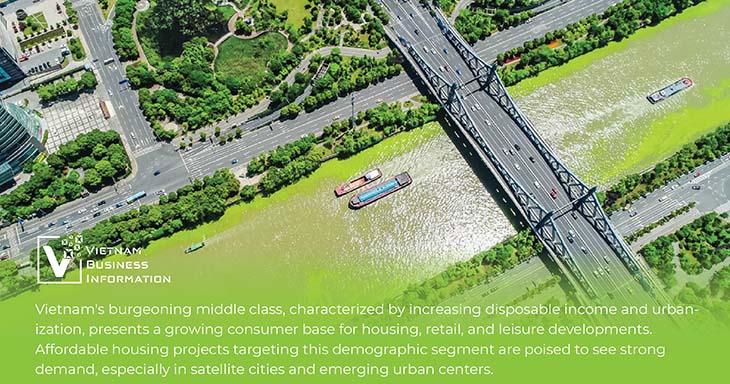Vietnam Affordable Housing A Way Forward

The document “Vietnam Affordable Housing: A Way Forward” addresses the pressing issue of affordable housing in Vietnam, exploring the challenges, current policies, and potential solutions to enhance housing accessibility for low-income populations.
Current Housing Landscape
Vietnam faces a significant housing crisis, particularly in urban areas where rapid population growth and economic development have led to soaring real estate prices. The government aims to construct 1 million social housing units by 2030, yet as of early 2024, only about 38,128 units had been completed, representing just 3.81% of the target. This shortfall highlights the urgent need for effective strategies to meet the growing demand for affordable housing.
Key Challenges
Several factors contribute to the affordable housing shortage in Vietnam:
- Land Scarcity: The availability of land suitable for development is limited, compounded by bureaucratic hurdles that delay project approvals.
- Rising Costs: Increasing land prices and construction costs make it difficult for developers to offer affordable units.
- Limited Financing: Access to credit remains a challenge for both developers and potential homeowners, with many unable to secure loans necessary for purchasing homes.
These challenges are exacerbated by a market that has largely focused on high-end developments, leaving a significant gap in affordable options.
Government Initiatives
The Vietnamese government has implemented various initiatives aimed at addressing the housing crisis:
- National Housing Strategy: This includes a commitment to building social housing units and improving living conditions for low-income workers, particularly those in industrial zones.
- Credit Packages: The government has introduced financial packages aimed at facilitating loans for social housing projects. However, disbursement has been slow due to bureaucratic inefficiencies.
Despite these efforts, the document notes that many policies have not kept pace with actual demand or have been inadequately enforced.
Role of Foreign Investment
The document emphasizes the potential role of foreign direct investment (FDI) in alleviating the housing shortage. It highlights successful examples where foreign firms have engaged in affordable housing projects, particularly in regions such as Binh Duong province. However, foreign investors often face challenges such as complex regulations and market entry barriers that can hinder their participation.
Proposed Solutions
To effectively tackle the affordable housing crisis, the document proposes several strategies:
- Streamlined Processes: Simplifying bureaucratic procedures for land acquisition and project approval can significantly accelerate housing development.
- Incentives for Developers: Offering tax breaks and financial incentives can encourage more developers to invest in affordable housing projects.
- Public-Private Partnerships: Collaborations between government entities and private developers can leverage resources and expertise to create more affordable units.
- Focus on Sustainable Development: Emphasizing environmentally friendly construction practices can help ensure the long-term viability and affordability of housing projects.
Community Engagement
Engaging local communities in the planning and development process is crucial. The document suggests that involving residents can lead to better-designed housing solutions that meet their specific needs and preferences.
Conclusion
The document concludes with a call for urgent action to address Vietnam’s affordable housing crisis. It stresses that without a concerted effort from all stakeholders—including government agencies, private developers, and community organizations—many low-income families will continue to struggle with inadequate living conditions. By implementing effective policies and fostering collaboration across sectors, Vietnam can move towards a more inclusive housing market that provides decent living opportunities for all its citizens. In summary, while Vietnam has made strides toward addressing its affordable housing challenges, significant work remains. A comprehensive approach that combines policy reform, community engagement, and increased investment is essential for creating sustainable solutions that benefit low-income households across the country.

Further reading: Marketing Strategies for Subdivision Housing Projects in Phnom Penh
Affordable Housing in Vietnam for Foreign Firms 2024
Ministry targets 130000 social housing units erected in 2024 – Vietnam Plus en.vietnamplus
